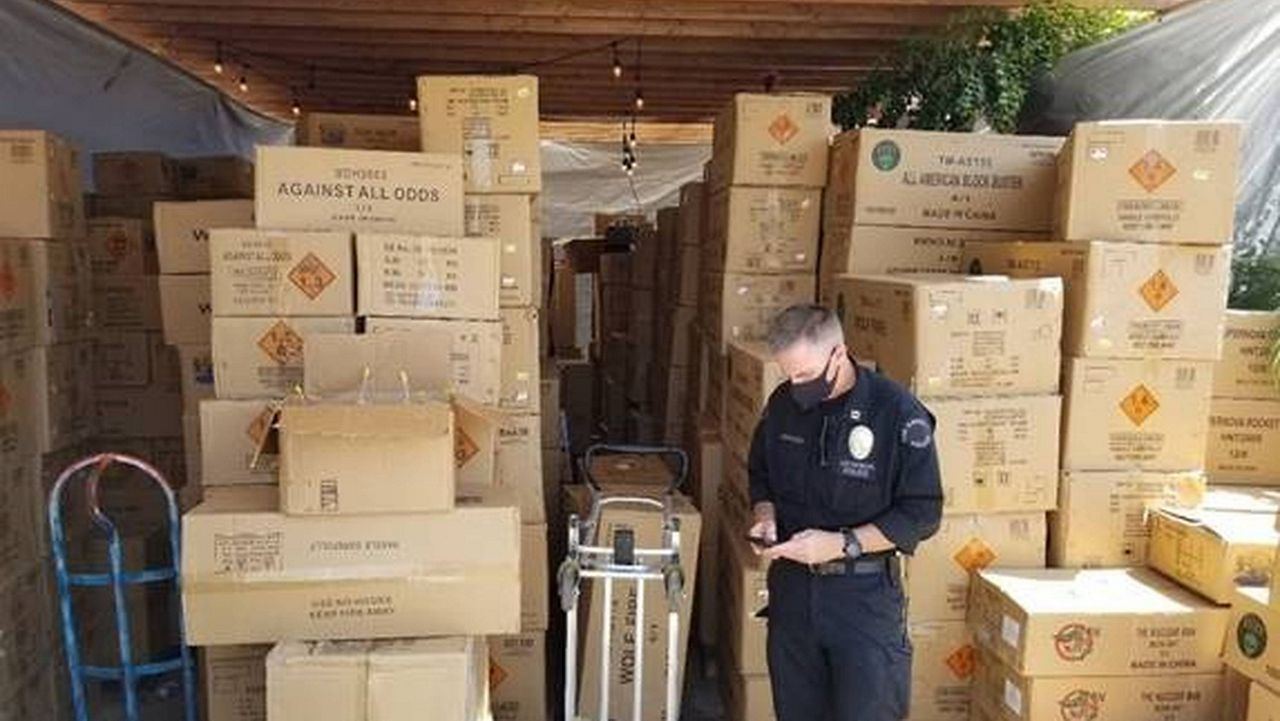LOS ANGELES (CNS) — A South Los Angeles man is expected to face a judge Tuesday on a federal charge of illegally transporting tons of explosives — including dangerous homemade devices that were detonated by police, leading to a massive explosion that destroyed a specially designed containment vehicle and injured 17 people.
Arturo Ceja III was arrested Saturday by special agents with the U.S. Bureau of Alcohol, Tobacco, Firearms and Explosives on a criminal complaint charging him with transporting explosives without a license. The charge carries a sentence of up to 10 years in federal prison, according to the U.S. Attorney's Office.
What You Need To Know
- A South Los Angeles man is expected to face a judge Tuesday on a federal charge of illegally transporting tons of explosives
- Included were dangerous homemade devices that were detonated by police, leading to a massive explosion that destroyed a specially designed containment vehicle and injured 17 people
- Arturo Ceja III was arrested Saturday by special agents with the U.S. Bureau of Alcohol, Tobacco, Firearms and Explosives on a criminal complaint charging him with transporting explosives without a license
- Ceja apparently planned to sell the fireworks throughout the neighborhood in celebration of the Fourth of July holiday
Ceja, 26, was initially arrested and booked after the Wednesday evening explosion on state criminal charges of possession of a destructive device and child endangerment, and was released after posting $500,000 bond Thursday. Two days later, he was taken into federal custody pending Tuesday's initial appearance before a magistrate judge in downtown Los Angeles.
Ceja apparently planned to sell the fireworks throughout the neighborhood in celebration of the Fourth of July holiday.
The federal complaint alleges that Ceja made several trips to Nevada in late June to purchase various types of explosives — including aerial displays and large homemade fireworks containing explosive materials — that he transported to his home in rental vans.
It was not immediately known if Ceja had retained an attorney.
Most of the explosives were purchased at Area 51, a fireworks dealer in Pahrump, Nevada. The complaint notes that fireworks in California can be sold for as much as four times what purchasers pay for them in Nevada.
Ceja told investigators that he purchased the homemade explosives — constructed of cardboard paper, hobby fuse and packed with explosive flash powder — from an individual selling the devices out of the trunk of a Honda in the Area 51 parking lot, according to the complaint.
"Ceja did not possess an ATF explosives license or permit of any kind that would authorize him to transport either aerial display fireworks or homemade fireworks made with explosive materials, including but not limited to flash powder," states the complaint affidavit, which was written by a special agent with the federal bureau.
On Wednesday, after receiving a tip that fireworks were being stored in Ceja's backyard, Los Angeles Police Department officers responded to his residence on East 27th Street. At the house, officers allegedly found more than 500 boxes of commercial grade fireworks in large cardboard boxes.
The initial investigation by local authorities estimated that 5,000 pounds of fireworks were found: However, on Saturday the ATF determined that Ceja was actually storing 32,000 pounds of fireworks in his backyard, officials said.
The fireworks were "stored outside and in an unsafe manner, namely under unsecured tents and next to cooking grills," the complaint alleges, adding that none of the commercial fireworks or homemade fireworks, which contained explosive materials, was stored in an approved method.
In addition to the commercial fireworks, the initial search of Ceja's residence led to the discovery of over 140 other homemade fireworks — typically referred to M devices of varying sizes — as well as explosives-making components, including hobby fuse that matched the fuse on a homemade mortar shell wrapped in tin foil discovered inside the residence, according to the affidavit.
While the fireworks were being removed from Ceja's home, an LAPD Bomb Squad determined that some of the homemade fireworks containing explosive materials were not safe to transport due to risk of detonation in a densely populated area and therefore would be destroyed on scene using a total containment vessel.
During the destruction of the devices, the entire TCV exploded, causing a massive blast radius, damaging several homes in the neighborhood and injuring 17 law enforcement personnel and residents. The damage extended at least a half-block from the blast.
The Los Angeles County Department of Public Health worked to identify accommodations to support medical needs and social services for those who had to be evacuated. An effort was also made to assist an elderly couple who voluntarily remained at the site.
An assistance center at Trinity Recreation Center, 2415 Trinity St., is open for residents impacted by the explosion. It will operate from 9 a.m. to 4 p.m. and remain open throughout this week. For information, call 213-484- 4835.
Meanwhile, Mayor Eric Garcetti directed the LAPD "to conduct a full investigation into this incident, so we can better understand why this happened."
Concerning the state case alleging possession of a destructive device and child endangerment, LAPD officials said Ceja's 10-year-old brother was at the home at the time of the fireworks discovery.



